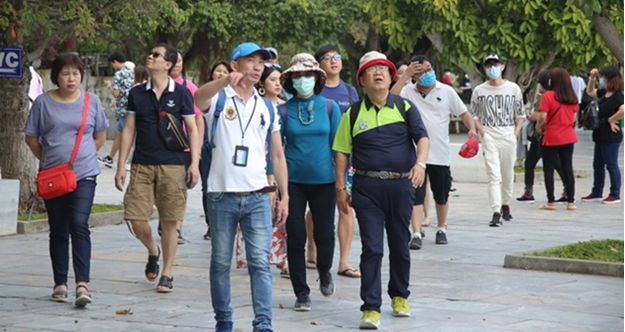As the growth rate increased at 22.7 % between 2015 and 2019, Vietnam’s tourism industry started the year 2020 with a record number of 2 million foreign visitors in only January, a 32.8% increase over the same period in 2019. The hope of reaching a target of receiving 20 million international tourists in 2020 seemed not to be difficult for the tourism industry but things turned upside down since February 2020, just one month later, when the first Covid 19 patient was detected in Vietnam. For almost two years, the bad impact and negative effect of Covid-19 quickly spreading have made Vietnam’s tourism much more difficult and confronted many unprecedented challenges. Most travel companies had to be decommissioned or were operating little, and as a result tour guides, drivers and other employees lost their jobs. All hotels, restaurants or other entertainment and shopping services relating to tourists must be closed, or opened only within the limits permitted to receive local guests and all activities that must be delayed so as to join hands with the whole country in the fight against the pandemic.
According to the General Statistical Office (2021), from March 2020 till now Vietnam has closed its door to international tourists due to Covid, only 3.8 million visitors travelled Vietnam in the whole year 2020 of which 96% international visitors came in the first quarter 2020, a decrease of 78.7% compared to 2019. The few foreigners coming to Vietnam are mainly foreign specialists or high skilled workers working on projects in Vietnam.
Diagram of international Visitors to Vietnam from 2016-2020

In general, the domestic tourist market is more favorable, but continually interrupted by social distancing with different ranges during the outbreak, even though the country took good control over Covid-19 in the previous three outbreaks. All tour companies have suffered terribly from Covid-19 so they have to operate partially, even many of them have stopped their business and subsequently hotels have to close their doors.
According to “Economy and Forecast” published on 18 September 2021,the country had a total of 3,339 travel companies in 2020, of which 2,519 are international travel enterprises, 820 are domestic ones, but the suspension has risen up to 90%-95%. Also in 2020, there were 201 tour companies being newly licensed for operation, while 338 others revoked their business licences. Among those who try to maintain their business operations, they must switch to do their business on the domestic market. Together with that, there are more than 30,000 accommodation facilities with a total of 650,000 rooms legally registered for tourists staying across the country, but their room occupancy reached only 20%-25%. In particular, provinces or cities and some key touristed centers, many hotels must close their doors or change their business purposes because of loss. More seriously, there have been more and more accommodation businesses selling their hotels at cheaper prices.
In the context of the complicated Covid-19 pandemic which has caused severe consequences for the country’s economy, many supporting packages were offered by the central government aimed at removing difficulties for businessmen and workers. Obviously, employers and employees working in the tourism industry were those who had more priorities, and certainly, they received more supporting policies such as extension of tax payment and money of land rent for travel agents, for accommodation and dining service business, museums, amusement parks; electricity price reduction for accommodation facilities and businesses; exemption or reduction of interest rates and other costs; access to interest-free preferential loans for businesses who pay their employees; financial support for tourism workers who have lost their jobs or taken unpaid leave due to the pandemic…
In such a bad situation for the economy in general and for the tourism industry in particular due to the unpredictable occurrence of the Covid-19 pandemic and its consequences, should there be synchronous solutions to save the situation and restore the national tourism industry in the future???
Firstly we must ensure the safety for visitors, for workers involved in the tourism industry, and the social community in the new period when the barriers to protocols on pandemic precaution are eased. In order to attain that idea successfully, the entire tourism industry must boost health measures on Covid-19 precaution for transporting services, regularly controlling and issuing medical eligibility certificates to Covid prevention for those who serve tourists face to face. In addition, the government should have preferential policies for businesses operating in the tourism industry such as tax exemption and reduction, applying electricity prices according to the price of electricity production units instead of service prices for facilities of catering and accommodating service business for tourists. Besides, the stimulation on domestic tourism is needed at the moment when the entrance to international tourists is almost closing by increasing trains, flights to bring guests to famous tourist centers in the country at reasonable prices. Towards travel agencies, it is necessary to offer tour itineraries in a short time, and not in a long-distance of travelling as well as other tours regarding nature spots, healthcare. They should provide other types of physical activities aimed at family union and interaction between friends in the journey, and enrich a variety of tour products with special attention paid to the culinary culture of each locality. Finally, it is advisable to apply digital technology to tourist services such as promoting the online booking of air and train tickets via text messages or other social networking platforms effectively to create favorable conditions for tourists and to limit the queues of people when buying tickets. In the context that the Covid-19 infection is still ongoing and difficult to predict, travel agents should prioritize choosing hotels that allow cancellations and deposit refunds for travellers due to unexpected outbreaks of Covid-19 pandemic rather than hotels with good brand name or lower prices.
Hopefully, the above solutions will be an important basis for all levels and sectors to pay attention, direct and organize the implementation of specific, synchronous and practical action programs to support the Vietnamese tourism industry quickly overcome difficulties, soon recover and grow again in the coming time.
Phong Doan
- Google Maps to revolutionize navigation with Satellite features, eliminating dead zones - April 22, 2024
- East Asia’s Growth Outpaces Global Average Amidst China’s Economic Challenges, Says World Bank - April 4, 2024
- EU Probes Apple, Google and Meta for Potential Violations of New Digital Law - March 27, 2024

